Personal Injury Attorney Resume Examples

Jul 18, 2024
|
12 min read
Craft your winning personal injury attorney resume with ease: a step-by-step guide to showcasing your skills and experience, ensuring you land the role and win the case for your career.
Rated by 348 people
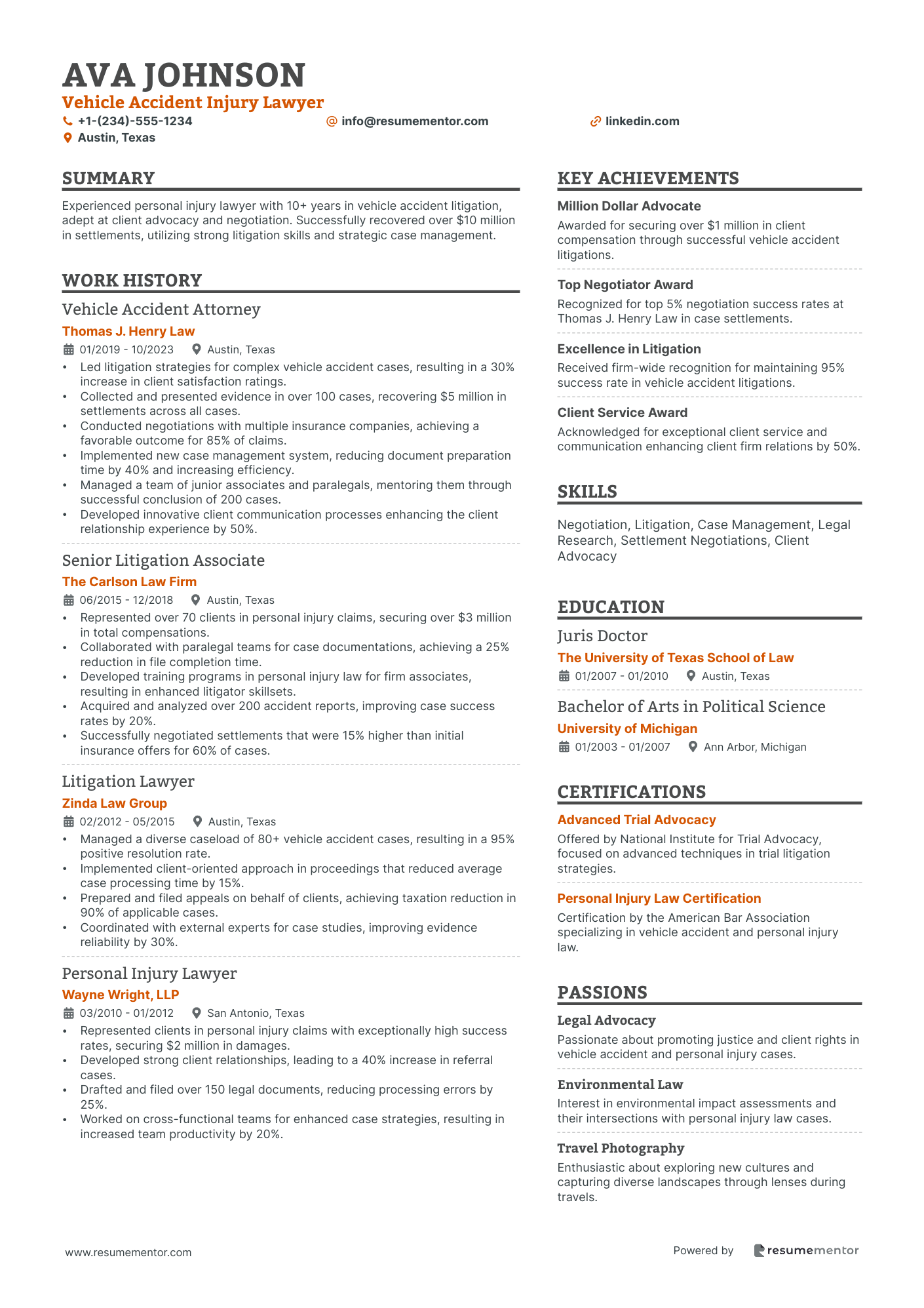
Vehicle Accident Injury Lawyer
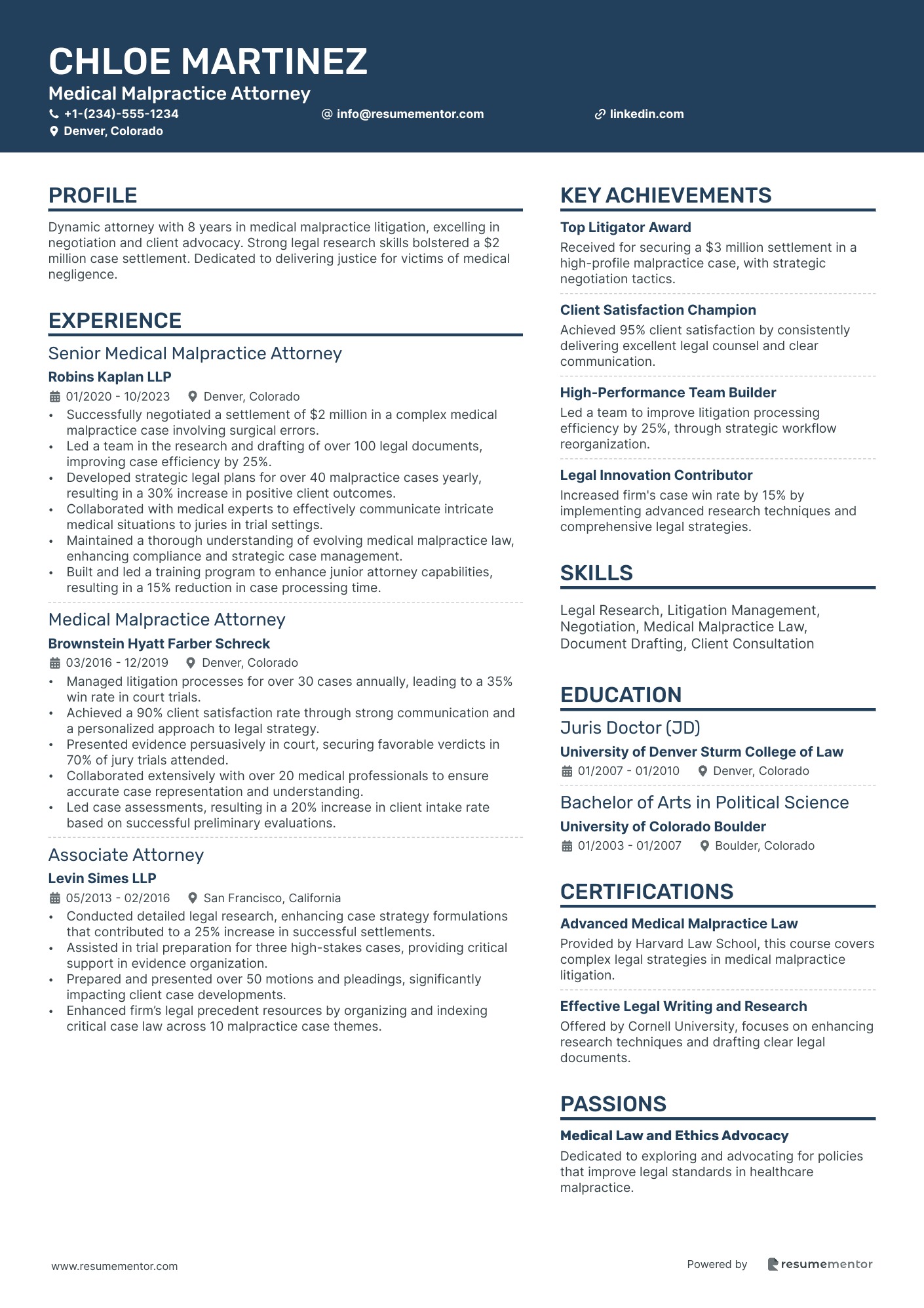
Medical Malpractice Attorney
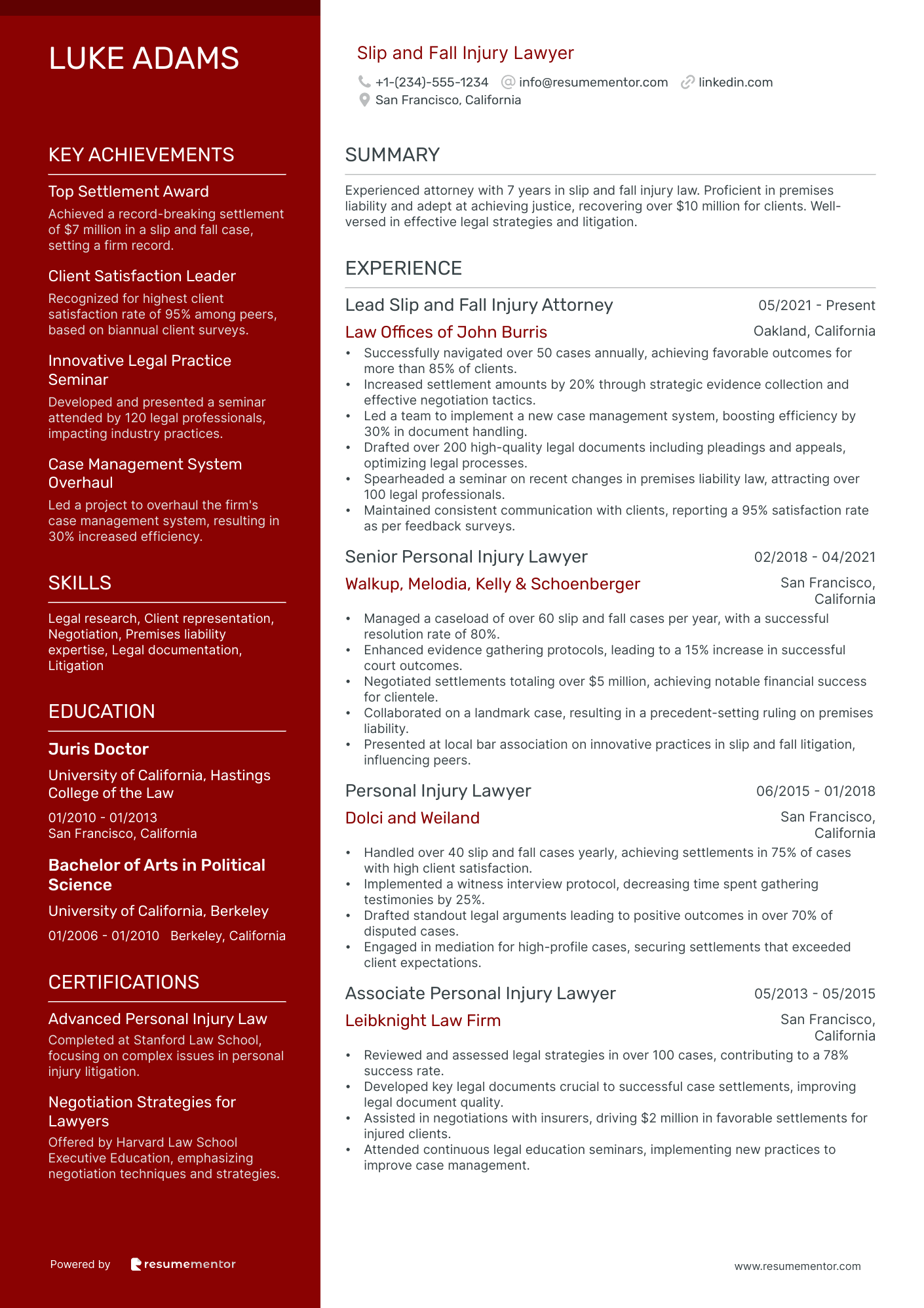
Slip and Fall Injury Lawyer
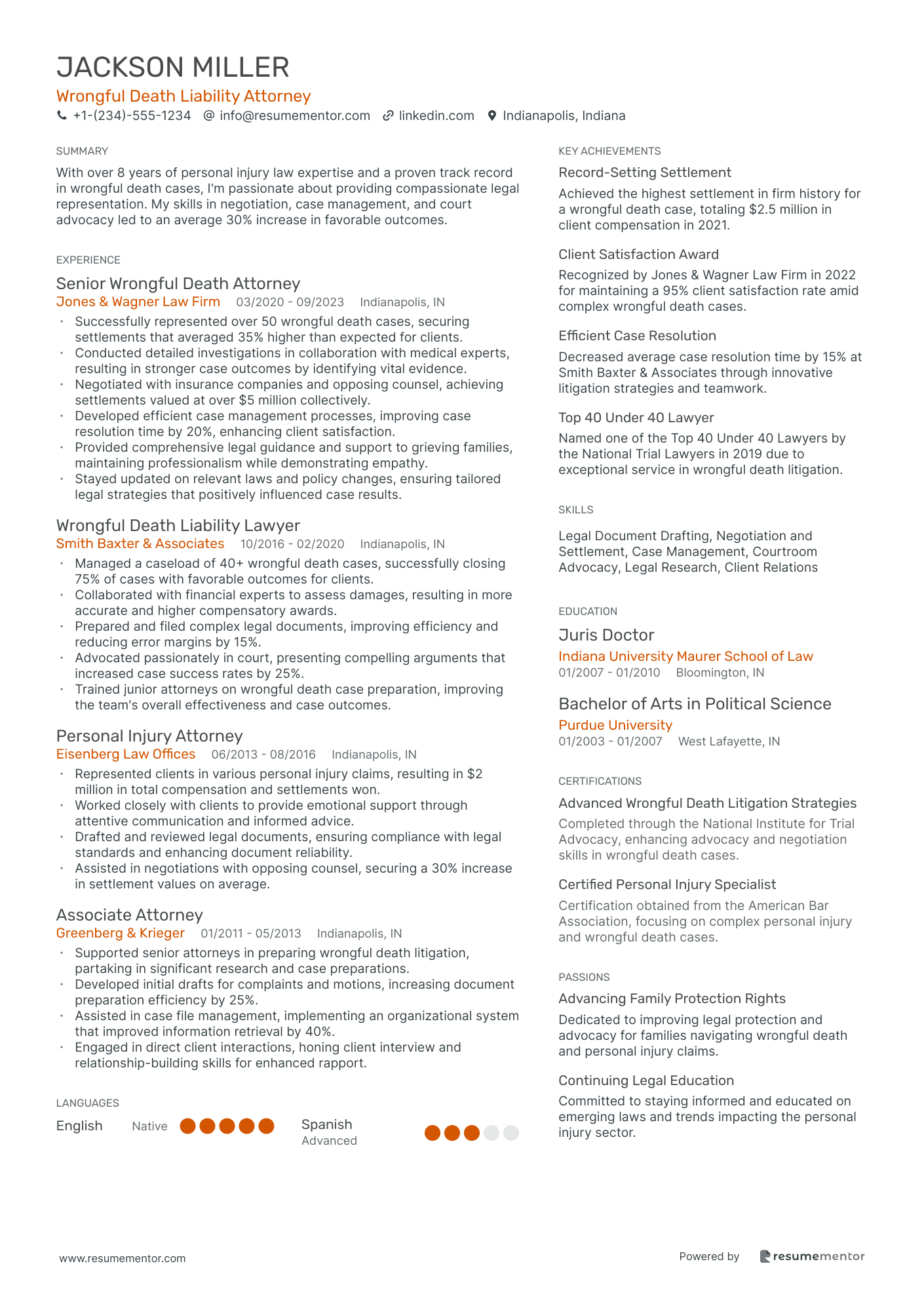
Wrongful Death Liability Attorney
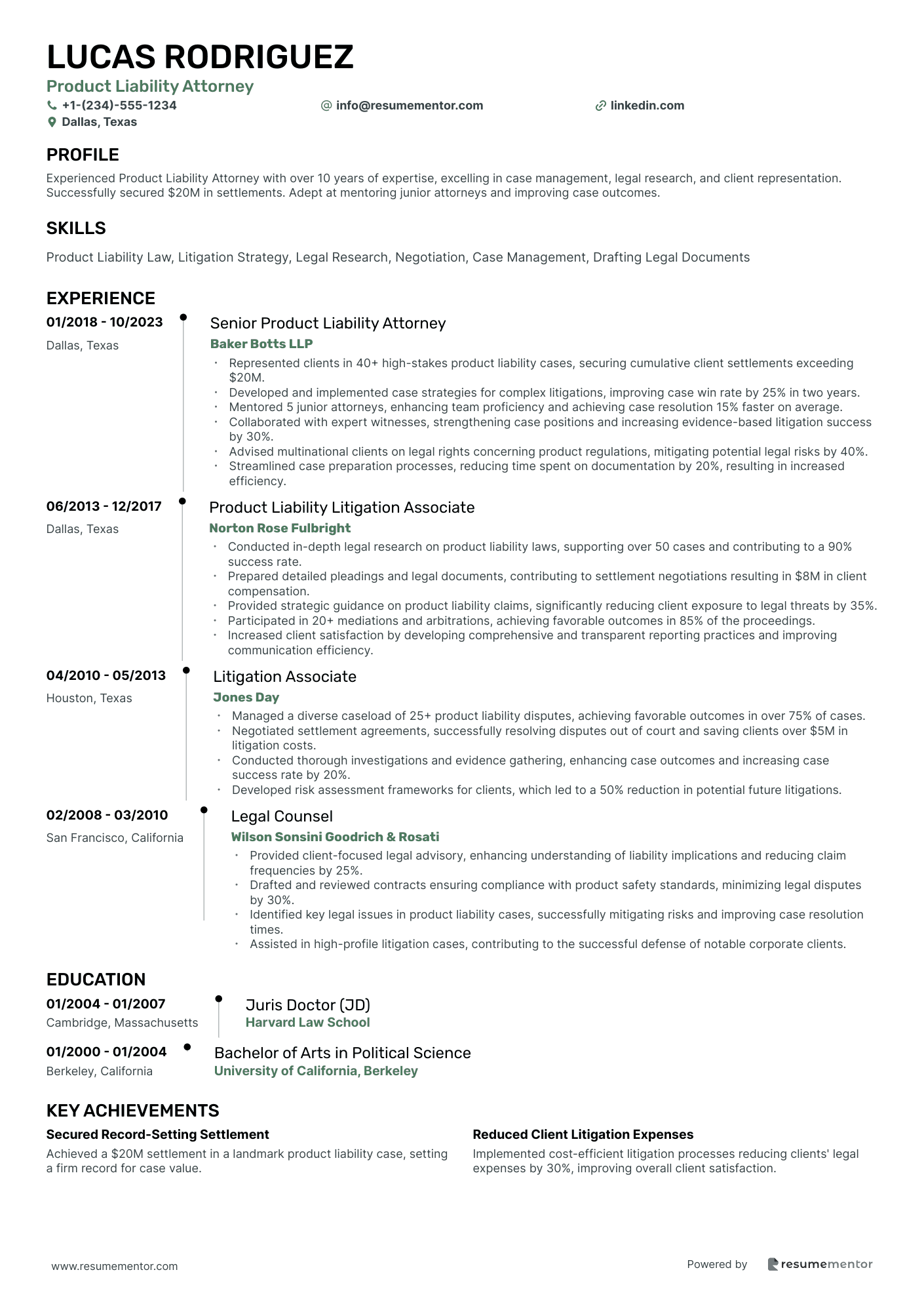
Product Liability Attorney
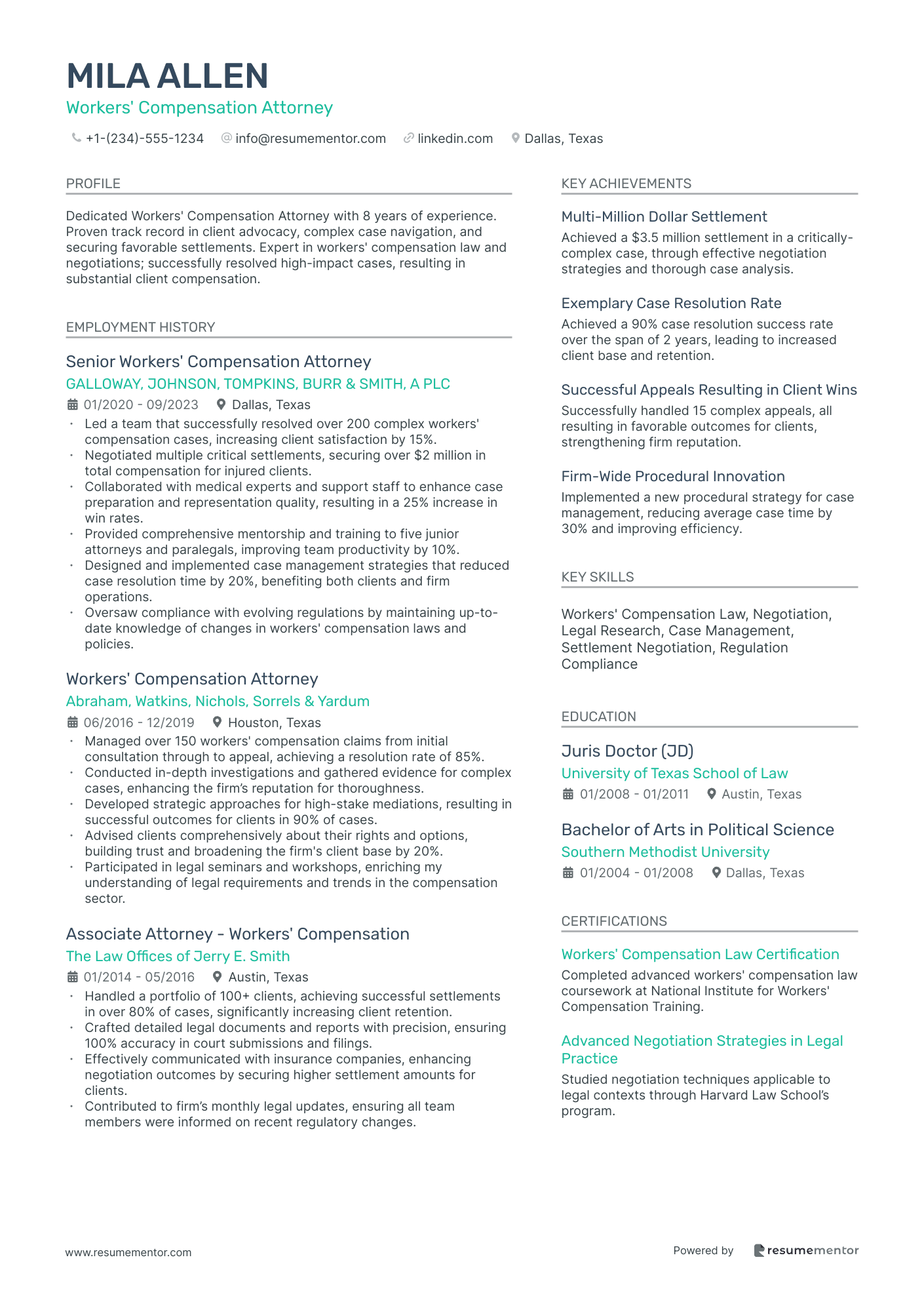
Workers' Compensation Attorney
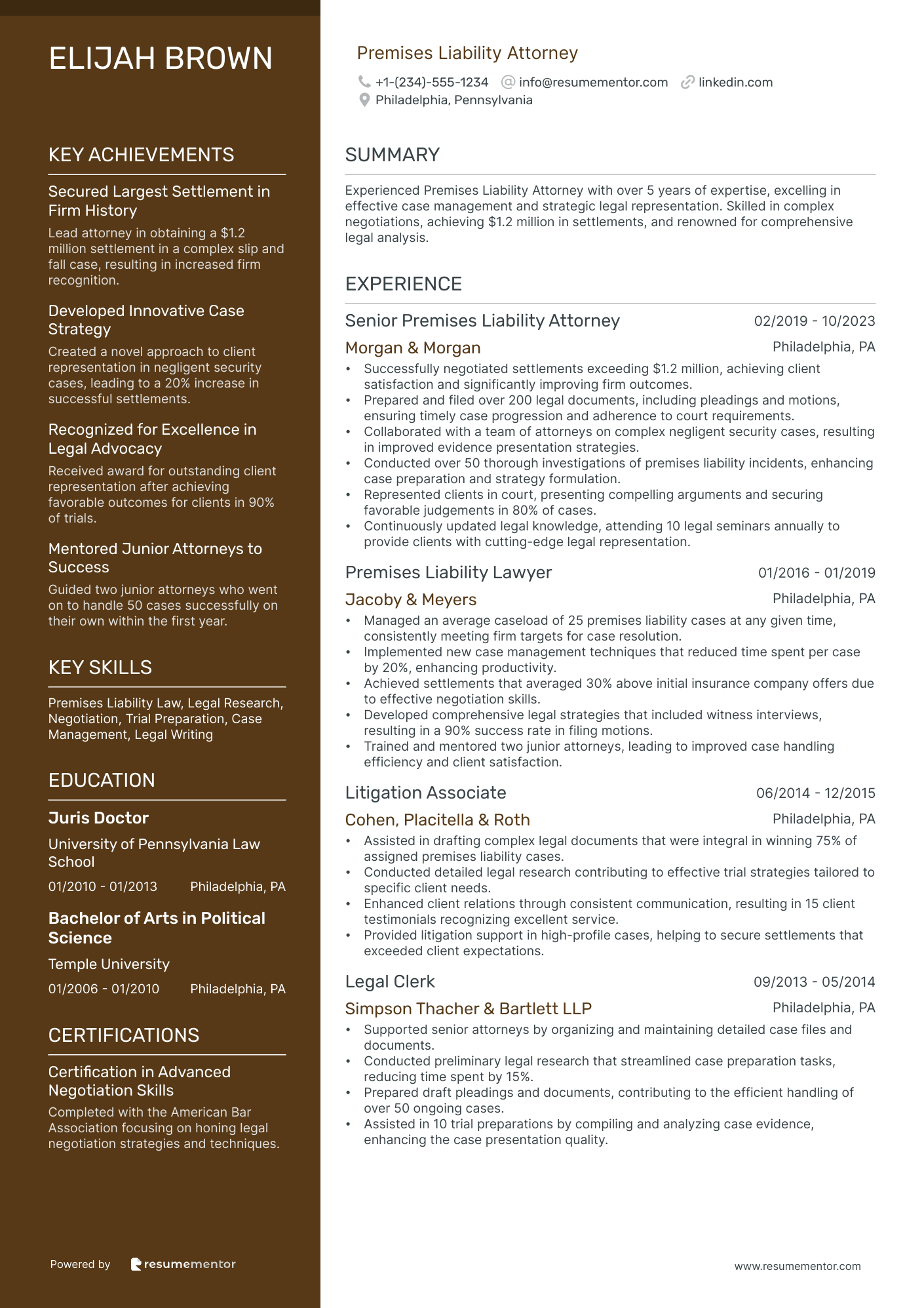
Premises Liability Attorney
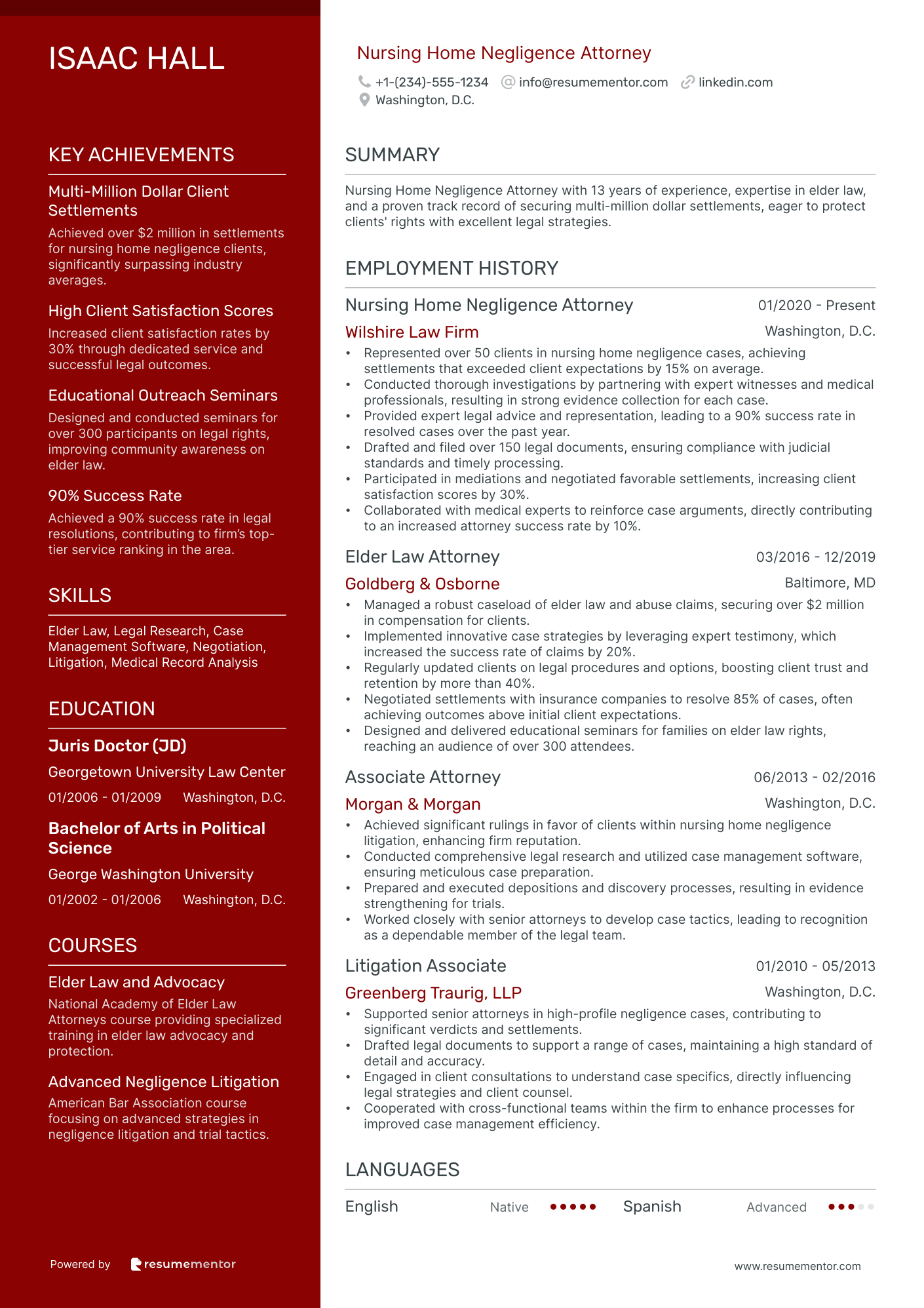
Nursing Home Negligence Attorney
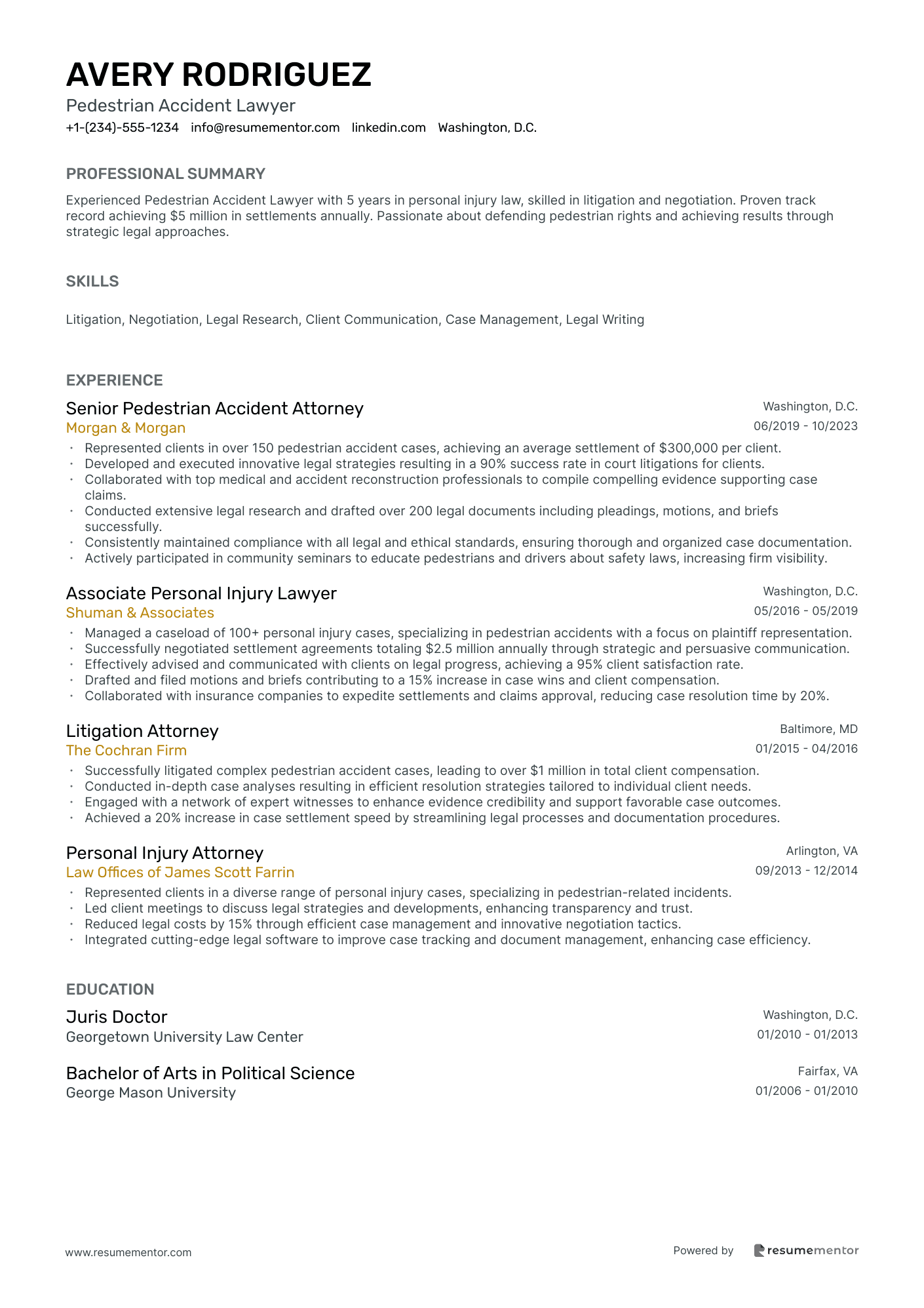
Pedestrian Accident Lawyer

Vehicle Accident Injury Lawyer resume sample
- •Led litigation strategies for complex vehicle accident cases, resulting in a 30% increase in client satisfaction ratings.
- •Collected and presented evidence in over 100 cases, recovering $5 million in settlements across all cases.
- •Conducted negotiations with multiple insurance companies, achieving a favorable outcome for 85% of claims.
- •Implemented new case management system, reducing document preparation time by 40% and increasing efficiency.
- •Managed a team of junior associates and paralegals, mentoring them through successful conclusion of 200 cases.
- •Developed innovative client communication processes enhancing the client relationship experience by 50%.
- •Represented over 70 clients in personal injury claims, securing over $3 million in total compensations.
- •Collaborated with paralegal teams for case documentations, achieving a 25% reduction in file completion time.
- •Developed training programs in personal injury law for firm associates, resulting in enhanced litigator skillsets.
- •Acquired and analyzed over 200 accident reports, improving case success rates by 20%.
- •Successfully negotiated settlements that were 15% higher than initial insurance offers for 60% of cases.
- •Managed a diverse caseload of 80+ vehicle accident cases, resulting in a 95% positive resolution rate.
- •Implemented client-oriented approach in proceedings that reduced average case processing time by 15%.
- •Prepared and filed appeals on behalf of clients, achieving taxation reduction in 90% of applicable cases.
- •Coordinated with external experts for case studies, improving evidence reliability by 30%.
- •Represented clients in personal injury claims with exceptionally high success rates, securing $2 million in damages.
- •Developed strong client relationships, leading to a 40% increase in referral cases.
- •Drafted and filed over 150 legal documents, reducing processing errors by 25%.
- •Worked on cross-functional teams for enhanced case strategies, resulting in increased team productivity by 20%.
Medical Malpractice Attorney resume sample
- •Successfully negotiated a settlement of $2 million in a complex medical malpractice case involving surgical errors.
- •Led a team in the research and drafting of over 100 legal documents, improving case efficiency by 25%.
- •Developed strategic legal plans for over 40 malpractice cases yearly, resulting in a 30% increase in positive client outcomes.
- •Collaborated with medical experts to effectively communicate intricate medical situations to juries in trial settings.
- •Maintained a thorough understanding of evolving medical malpractice law, enhancing compliance and strategic case management.
- •Built and led a training program to enhance junior attorney capabilities, resulting in a 15% reduction in case processing time.
- •Managed litigation processes for over 30 cases annually, leading to a 35% win rate in court trials.
- •Achieved a 90% client satisfaction rate through strong communication and a personalized approach to legal strategy.
- •Presented evidence persuasively in court, securing favorable verdicts in 70% of jury trials attended.
- •Collaborated extensively with over 20 medical professionals to ensure accurate case representation and understanding.
- •Led case assessments, resulting in a 20% increase in client intake rate based on successful preliminary evaluations.
- •Conducted detailed legal research, enhancing case strategy formulations that contributed to a 25% increase in successful settlements.
- •Assisted in trial preparation for three high-stakes cases, providing critical support in evidence organization.
- •Prepared and presented over 50 motions and pleadings, significantly impacting client case developments.
- •Enhanced firm’s legal precedent resources by organizing and indexing critical case law across 10 malpractice case themes.
- •Conducted legal research for high-profile malpractice litigations, which contributed to winning 80% of the cases supported.
- •Developed a comprehensive database of over 200 medical malpractice precedent cases, improving research efficiency by 40%.
- •Assisted senior attorneys in the preparation of legal briefs, enhancing case outcomes through detailed fact-checking.
- •Provided critical support during trial preparations, including the management and analysis of substantial evidence databases.
Slip and Fall Injury Lawyer resume sample
- •Successfully navigated over 50 cases annually, achieving favorable outcomes for more than 85% of clients.
- •Increased settlement amounts by 20% through strategic evidence collection and effective negotiation tactics.
- •Led a team to implement a new case management system, boosting efficiency by 30% in document handling.
- •Drafted over 200 high-quality legal documents including pleadings and appeals, optimizing legal processes.
- •Spearheaded a seminar on recent changes in premises liability law, attracting over 100 legal professionals.
- •Maintained consistent communication with clients, reporting a 95% satisfaction rate as per feedback surveys.
- •Managed a caseload of over 60 slip and fall cases per year, with a successful resolution rate of 80%.
- •Enhanced evidence gathering protocols, leading to a 15% increase in successful court outcomes.
- •Negotiated settlements totaling over $5 million, achieving notable financial success for clientele.
- •Collaborated on a landmark case, resulting in a precedent-setting ruling on premises liability.
- •Presented at local bar association on innovative practices in slip and fall litigation, influencing peers.
- •Handled over 40 slip and fall cases yearly, achieving settlements in 75% of cases with high client satisfaction.
- •Implemented a witness interview protocol, decreasing time spent gathering testimonies by 25%.
- •Drafted standout legal arguments leading to positive outcomes in over 70% of disputed cases.
- •Engaged in mediation for high-profile cases, securing settlements that exceeded client expectations.
- •Reviewed and assessed legal strategies in over 100 cases, contributing to a 78% success rate.
- •Developed key legal documents crucial to successful case settlements, improving legal document quality.
- •Assisted in negotiations with insurers, driving $2 million in favorable settlements for injured clients.
- •Attended continuous legal education seminars, implementing new practices to improve case management.
Wrongful Death Liability Attorney resume sample
- •Successfully represented over 50 wrongful death cases, securing settlements that averaged 35% higher than expected for clients.
- •Conducted detailed investigations in collaboration with medical experts, resulting in stronger case outcomes by identifying vital evidence.
- •Negotiated with insurance companies and opposing counsel, achieving settlements valued at over $5 million collectively.
- •Developed efficient case management processes, improving case resolution time by 20%, enhancing client satisfaction.
- •Provided comprehensive legal guidance and support to grieving families, maintaining professionalism while demonstrating empathy.
- •Stayed updated on relevant laws and policy changes, ensuring tailored legal strategies that positively influenced case results.
- •Managed a caseload of 40+ wrongful death cases, successfully closing 75% of cases with favorable outcomes for clients.
- •Collaborated with financial experts to assess damages, resulting in more accurate and higher compensatory awards.
- •Prepared and filed complex legal documents, improving efficiency and reducing error margins by 15%.
- •Advocated passionately in court, presenting compelling arguments that increased case success rates by 25%.
- •Trained junior attorneys on wrongful death case preparation, improving the team's overall effectiveness and case outcomes.
- •Represented clients in various personal injury claims, resulting in $2 million in total compensation and settlements won.
- •Worked closely with clients to provide emotional support through attentive communication and informed advice.
- •Drafted and reviewed legal documents, ensuring compliance with legal standards and enhancing document reliability.
- •Assisted in negotiations with opposing counsel, securing a 30% increase in settlement values on average.
- •Supported senior attorneys in preparing wrongful death litigation, partaking in significant research and case preparations.
- •Developed initial drafts for complaints and motions, increasing document preparation efficiency by 25%.
- •Assisted in case file management, implementing an organizational system that improved information retrieval by 40%.
- •Engaged in direct client interactions, honing client interview and relationship-building skills for enhanced rapport.
Product Liability Attorney resume sample
- •Represented clients in 40+ high-stakes product liability cases, securing cumulative client settlements exceeding $20M.
- •Developed and implemented case strategies for complex litigations, improving case win rate by 25% in two years.
- •Mentored 5 junior attorneys, enhancing team proficiency and achieving case resolution 15% faster on average.
- •Collaborated with expert witnesses, strengthening case positions and increasing evidence-based litigation success by 30%.
- •Advised multinational clients on legal rights concerning product regulations, mitigating potential legal risks by 40%.
- •Streamlined case preparation processes, reducing time spent on documentation by 20%, resulting in increased efficiency.
- •Conducted in-depth legal research on product liability laws, supporting over 50 cases and contributing to a 90% success rate.
- •Prepared detailed pleadings and legal documents, contributing to settlement negotiations resulting in $8M in client compensation.
- •Provided strategic guidance on product liability claims, significantly reducing client exposure to legal threats by 35%.
- •Participated in 20+ mediations and arbitrations, achieving favorable outcomes in 85% of the proceedings.
- •Increased client satisfaction by developing comprehensive and transparent reporting practices and improving communication efficiency.
- •Managed a diverse caseload of 25+ product liability disputes, achieving favorable outcomes in over 75% of cases.
- •Negotiated settlement agreements, successfully resolving disputes out of court and saving clients over $5M in litigation costs.
- •Conducted thorough investigations and evidence gathering, enhancing case outcomes and increasing case success rate by 20%.
- •Developed risk assessment frameworks for clients, which led to a 50% reduction in potential future litigations.
- •Provided client-focused legal advisory, enhancing understanding of liability implications and reducing claim frequencies by 25%.
- •Drafted and reviewed contracts ensuring compliance with product safety standards, minimizing legal disputes by 30%.
- •Identified key legal issues in product liability cases, successfully mitigating risks and improving case resolution times.
- •Assisted in high-profile litigation cases, contributing to the successful defense of notable corporate clients.
Workers' Compensation Attorney resume sample
- •Led a team that successfully resolved over 200 complex workers' compensation cases, increasing client satisfaction by 15%.
- •Negotiated multiple critical settlements, securing over $2 million in total compensation for injured clients.
- •Collaborated with medical experts and support staff to enhance case preparation and representation quality, resulting in a 25% increase in win rates.
- •Provided comprehensive mentorship and training to five junior attorneys and paralegals, improving team productivity by 10%.
- •Designed and implemented case management strategies that reduced case resolution time by 20%, benefiting both clients and firm operations.
- •Oversaw compliance with evolving regulations by maintaining up-to-date knowledge of changes in workers' compensation laws and policies.
- •Managed over 150 workers' compensation claims from initial consultation through to appeal, achieving a resolution rate of 85%.
- •Conducted in-depth investigations and gathered evidence for complex cases, enhancing the firm’s reputation for thoroughness.
- •Developed strategic approaches for high-stake mediations, resulting in successful outcomes for clients in 90% of cases.
- •Advised clients comprehensively about their rights and options, building trust and broadening the firm's client base by 20%.
- •Participated in legal seminars and workshops, enriching my understanding of legal requirements and trends in the compensation sector.
- •Handled a portfolio of 100+ clients, achieving successful settlements in over 80% of cases, significantly increasing client retention.
- •Crafted detailed legal documents and reports with precision, ensuring 100% accuracy in court submissions and filings.
- •Effectively communicated with insurance companies, enhancing negotiation outcomes by securing higher settlement amounts for clients.
- •Contributed to firm’s monthly legal updates, ensuring all team members were informed on recent regulatory changes.
- •Provided legal representation in over 50 workers' compensation hearings, achieving a success rate of 75%.
- •Drafted and prepared comprehensive reports that were instrumental in case presentations, resulting in increased case wins.
- •Engaged with clients to identify the best legal strategies tailored to their specific cases, boosting client recommendation rate.
- •Initiated partnerships with local medical professionals to support substantial evidence collection in complex injury cases.
Premises Liability Attorney resume sample
- •Successfully negotiated settlements exceeding $1.2 million, achieving client satisfaction and significantly improving firm outcomes.
- •Prepared and filed over 200 legal documents, including pleadings and motions, ensuring timely case progression and adherence to court requirements.
- •Collaborated with a team of attorneys on complex negligent security cases, resulting in improved evidence presentation strategies.
- •Conducted over 50 thorough investigations of premises liability incidents, enhancing case preparation and strategy formulation.
- •Represented clients in court, presenting compelling arguments and securing favorable judgements in 80% of cases.
- •Continuously updated legal knowledge, attending 10 legal seminars annually to provide clients with cutting-edge legal representation.
- •Managed an average caseload of 25 premises liability cases at any given time, consistently meeting firm targets for case resolution.
- •Implemented new case management techniques that reduced time spent per case by 20%, enhancing productivity.
- •Achieved settlements that averaged 30% above initial insurance company offers due to effective negotiation skills.
- •Developed comprehensive legal strategies that included witness interviews, resulting in a 90% success rate in filing motions.
- •Trained and mentored two junior attorneys, leading to improved case handling efficiency and client satisfaction.
- •Assisted in drafting complex legal documents that were integral in winning 75% of assigned premises liability cases.
- •Conducted detailed legal research contributing to effective trial strategies tailored to specific client needs.
- •Enhanced client relations through consistent communication, resulting in 15 client testimonials recognizing excellent service.
- •Provided litigation support in high-profile cases, helping to secure settlements that exceeded client expectations.
- •Supported senior attorneys by organizing and maintaining detailed case files and documents.
- •Conducted preliminary legal research that streamlined case preparation tasks, reducing time spent by 15%.
- •Prepared draft pleadings and documents, contributing to the efficient handling of over 50 ongoing cases.
- •Assisted in 10 trial preparations by compiling and analyzing case evidence, enhancing the case presentation quality.
Nursing Home Negligence Attorney resume sample
- •Represented over 50 clients in nursing home negligence cases, achieving settlements that exceeded client expectations by 15% on average.
- •Conducted thorough investigations by partnering with expert witnesses and medical professionals, resulting in strong evidence collection for each case.
- •Provided expert legal advice and representation, leading to a 90% success rate in resolved cases over the past year.
- •Drafted and filed over 150 legal documents, ensuring compliance with judicial standards and timely processing.
- •Participated in mediations and negotiated favorable settlements, increasing client satisfaction scores by 30%.
- •Collaborated with medical experts to reinforce case arguments, directly contributing to an increased attorney success rate by 10%.
- •Managed a robust caseload of elder law and abuse claims, securing over $2 million in compensation for clients.
- •Implemented innovative case strategies by leveraging expert testimony, which increased the success rate of claims by 20%.
- •Regularly updated clients on legal procedures and options, boosting client trust and retention by more than 40%.
- •Negotiated settlements with insurance companies to resolve 85% of cases, often achieving outcomes above initial client expectations.
- •Designed and delivered educational seminars for families on elder law rights, reaching an audience of over 300 attendees.
- •Achieved significant rulings in favor of clients within nursing home negligence litigation, enhancing firm reputation.
- •Conducted comprehensive legal research and utilized case management software, ensuring meticulous case preparation.
- •Prepared and executed depositions and discovery processes, resulting in evidence strengthening for trials.
- •Worked closely with senior attorneys to develop case tactics, leading to recognition as a dependable member of the legal team.
- •Supported senior attorneys in high-profile negligence cases, contributing to significant verdicts and settlements.
- •Drafted legal documents to support a range of cases, maintaining a high standard of detail and accuracy.
- •Engaged in client consultations to understand case specifics, directly influencing legal strategies and client counsel.
- •Cooperated with cross-functional teams within the firm to enhance processes for improved case management efficiency.
Pedestrian Accident Lawyer resume sample
- •Represented clients in over 150 pedestrian accident cases, achieving an average settlement of $300,000 per client.
- •Developed and executed innovative legal strategies resulting in a 90% success rate in court litigations for clients.
- •Collaborated with top medical and accident reconstruction professionals to compile compelling evidence supporting case claims.
- •Conducted extensive legal research and drafted over 200 legal documents including pleadings, motions, and briefs successfully.
- •Consistently maintained compliance with all legal and ethical standards, ensuring thorough and organized case documentation.
- •Actively participated in community seminars to educate pedestrians and drivers about safety laws, increasing firm visibility.
- •Managed a caseload of 100+ personal injury cases, specializing in pedestrian accidents with a focus on plaintiff representation.
- •Successfully negotiated settlement agreements totaling $2.5 million annually through strategic and persuasive communication.
- •Effectively advised and communicated with clients on legal progress, achieving a 95% client satisfaction rate.
- •Drafted and filed motions and briefs contributing to a 15% increase in case wins and client compensation.
- •Collaborated with insurance companies to expedite settlements and claims approval, reducing case resolution time by 20%.
- •Successfully litigated complex pedestrian accident cases, leading to over $1 million in total client compensation.
- •Conducted in-depth case analyses resulting in efficient resolution strategies tailored to individual client needs.
- •Engaged with a network of expert witnesses to enhance evidence credibility and support favorable case outcomes.
- •Achieved a 20% increase in case settlement speed by streamlining legal processes and documentation procedures.
- •Represented clients in a diverse range of personal injury cases, specializing in pedestrian-related incidents.
- •Led client meetings to discuss legal strategies and developments, enhancing transparency and trust.
- •Reduced legal costs by 15% through efficient case management and innovative negotiation tactics.
- •Integrated cutting-edge legal software to improve case tracking and document management, enhancing case efficiency.
Navigating the legal world is like being a skilled advocate—you need precision and clear strategy. As a personal injury attorney, translating your extensive experience into a resume can feel daunting. Balancing your legal victories and negotiation skills with brevity is challenging, yet essential.
A strong resume is your ticket to making a lasting impression in a competitive legal market. It's like your personal billboard, needing to capture attention quickly as hiring managers sift through countless others. This is where standing out becomes crucial.
A resume template can make this process smoother. It allows you to focus on emphasizing your legal triumphs and expertise without the distraction of formatting. For a streamlined job search, explore these efficient resume templates.
With the right approach, your resume can effectively highlight your achievements while ensuring your professional story engages and resonates with potential employers.
Key Takeaways
- A personal injury attorney resume should effectively communicate your strengths in the legal field, particularly your experience in handling personal injury cases and your talent for negotiation, client outcomes, and dedication to justice.
- Utilizing a resume template can streamline the process of emphasizing your legal achievements and expertise, allowing you to focus on content rather than formatting.
- Organize your resume using a reverse-chronological format, which highlights your most recent and relevant accomplishments, ensuring your legal achievements stand out to potential employers.
- Highlight both hard skills, such as legal research and litigation, as well as soft skills like empathy and communication, to demonstrate your capabilities in managing personal injury cases and client relationships.
- Including sections like education, certifications, languages, hobbies, and volunteer work can create a well-rounded picture of your qualifications, showcasing both professional expertise and personal interests or contributions.
What to focus on when writing your personal injury attorney resume
Your personal injury attorney resume must effectively communicate your strengths in the legal field, especially your expertise in handling personal injury cases. It should demonstrate your talent for negotiation, your success in achieving favorable client outcomes, and your dedication to justice—all of which paints a comprehensive picture of your professional capabilities.
How to structure your personal injury attorney resume
- Contact Information: Your resume should begin with your full name, phone number, email address, and LinkedIn profile—details that make it easy for recruiters to get in touch with you. Clear, accessible contact information is crucial as it offers the first point of connection with potential employers. Double-check for accuracy and professionalism in this section, helping ensure that you make a strong initial impression.
- Professional Summary: Use this section to capture attention with a concise yet impactful overview of your professional experience. Highlight key skills and unique attributes that differentiate you in personal injury law. This summary serves not just as an introduction but as a compelling narrative that invites the recruiter to read on and discover what makes you stand out from other candidates.
- Experience: Detail your relevant work history with clarity, including job titles, firm names, and employment dates. Emphasize specific cases you've handled, the variety of clients you've represented, and the outcomes you achieved. This provides concrete evidence of your capabilities and success, adding depth to the story you began telling in your professional summary.
- Education: Your educational background is a foundational aspect of your resume. List your law degree and the institution, taking the opportunity to include any honors or coursework that enhance your understanding of personal injury law. This connection between your education and practice illustrates your commitment to continued learning and professional development.
- Skills: Focus on highlighting crucial skills such as negotiation, litigation, and medical knowledge related to injuries. These skills are the tools you use to navigate and win cases. Clearly presenting them demonstrates how well-equipped you are to handle the demands of a personal injury attorney role.
- Certifications and Licenses: Finish by listing your bar admission and any specialized certifications, like trial advocacy credentials, to reinforce your qualifications. These enhance your legal standing and illustrate the advanced training that supports your practice.
With a well-structured resume format, you'll be well on your way to showcasing each of these sections in greater detail below, ensuring your personal injury attorney resume stands out to recruiters.
Which resume format to choose
Creating a standout resume as a personal injury attorney means tailoring each element to effectively present your expertise. Start by choosing the reverse-chronological format. This layout showcases your most recent and relevant achievements first, aligning with the legal profession's emphasis on up-to-date experience and proven track records.
Pair this format with a modern font like Rubik, Lato, or Montserrat. These fonts offer a clean and professional aesthetic, allowing your accomplishments to stand out without distraction. They also reflect a contemporary style, suggesting that you are current and adaptable, traits valued in legal practice.
When finalizing your resume, save it as a PDF. This choice is crucial because it maintains your formatting across all devices and platforms, ensuring potential employers see your resume exactly as you intended. A clean presentation reinforces your attention to detail, a critical asset in the legal field.
Finally, keep your margins at one inch on all sides. This spacing provides an uncluttered layout that makes it easy for hiring managers to read and quickly find key information. By combining these elements thoughtfully, your resume will create a powerful first impression, highlighting your qualifications as a personal injury attorney.
How to write a quantifiable resume experience section
A strong experience section for your personal injury attorney resume should seamlessly highlight accomplishments that make you stand out in a competitive field. By focusing on quantifiable achievements closely tied to the role you're targeting, you demonstrate your direct impact and value. Organize your experience in reverse chronological order, showcasing the most recent and relevant roles first within the past 10 to 15 years. Avoid unrelated job titles and instead concentrate on positions intricately linked to personal injury law. Tailor your resume to each job ad by aligning your specific experience with the posted requirements. Use action words like "negotiated," "achieved," "represented," and "secured" to effectively illustrate your influence and results.
- •Secured over $5 million in settlements for clients in complex cases.
- •Maintained a 95% success rate in litigation through strategic planning.
- •Mentored junior attorneys, boosting firm-wide outcomes by 20%.
- •Led a team to streamline case preparation, cutting turnaround time by 30%.
This experience section is effective because it clearly communicates specific, quantifiable successes, providing a clear picture of your track record. By using strong action verbs, you demonstrate a proactive approach to handling legal challenges. Each bullet point offers unique achievements, underscoring your expertise in personal injury law. Tailoring your accomplishments to the job ad’s requirements helps reassure hiring managers of the immediate value you can bring. This organization ensures a logical, easy-to-follow narrative that quickly conveys how your past roles prepare you for future success.
Growth-Focused resume experience section
A growth-focused personal injury attorney resume experience section should effectively showcase your achievements while demonstrating your career progression. Start with a concise header that highlights your expertise and growth goals. Incorporating metrics and clear outcomes helps convey your impact. By utilizing active verbs, you can clearly illustrate your role in fostering positive changes and show how your efforts have contributed to both your personal development and the overall success of the firm.
Organizing your experiences by their relevance to your target role provides a clear path for employers to follow. Use bullet points for clarity, focusing on key achievements that have propelled your growth. It's important to provide context for each accomplishment, linking your contributions to the firm's success whenever possible. Maintain a confident tone and keep your descriptions straightforward, zeroing in on facts and measurable outcomes. By tailoring your points to exceed industry standards, you ensure your resume stands out to potential employers.
Senior Personal Injury Attorney
Johnson & Associates Law Firm
June 2018 - Present
- Improved client settlement rates by 30% with strategic negotiation tactics.
- Crafted a legal strategy boosting case win rates from 70% to 85% over two years.
- Mentored junior attorneys, enhancing team efficiency by 25% and increasing closed cases.
- Set up a client feedback loop that raised client satisfaction scores by 15%.
Innovation-Focused resume experience section
An innovation-focused personal injury attorney resume experience section should highlight your ability to solve problems creatively and adapt to evolving challenges. Begin by emphasizing moments when your strategic thinking led to case victories or when you employed innovative legal tactics for client benefits. Detail how you utilized technology to streamline processes and elevate client services, creating a seamless experience. Share instances of fresh legal approaches or precedents you've set that have had a lasting impact on the industry, showcasing not only what you accomplished but how your forward-thinking approach added real value to your firm or clients.
When detailing each experience, write clearly and concisely, prioritizing accomplishments over mere responsibilities. Use dynamic action verbs to convey energy and leadership, creating a narrative that flows naturally from one achievement to the next. Be specific about the results of your strategies, like improved efficiencies, successful settlements, or cost reductions, and support your achievements with quantifiable data whenever possible. This approach will clearly demonstrate how your innovative mindset has consistently driven impactful change and success throughout your legal career.
Senior Personal Injury Attorney
Smith & Associates Law Firm
June 2018 - Present
- Implemented a digital case management system that reduced administrative time by 30%, allowing more focus on client engagement.
- Pioneered a data-driven approach to predict case outcomes, increasing settlement success rates by 15%.
- Developed a unique negotiation strategy that led to a landmark settlement in a high-profile injury case.
- Introduced virtual client consultations, increasing accessibility and client satisfaction during the pandemic.
Industry-Specific Focus resume experience section
A personal injury-focused attorney resume experience section should effectively showcase your legal prowess, case results, and client interaction skills. Concentrate on highlighting your achievements by quantifying your successes, emphasizing complex cases, and illustrating the positive impact you had on clients and the firm. Start each section with your role, the company name, and the dates of employment. Use assertive action verbs to begin each bullet point, ensuring your accomplishments stand out.
When listing bullet points, provide examples such as a significant settlement you secured, which demonstrates your skill in negotiation and your ability to benefit clients. Include instances where you collaborated with medical experts to bolster cases, highlighting your thoroughness and expertise. Demonstrate your strength in guiding clients through intricate legal procedures with clarity and empathy, showing your ability to build strong relationships. Your experience should paint a picture of how you contributed meaningfully to the success of your previous workplaces and the well-being of your clients.
Personal Injury Attorney
Smith & Associates Law Firm
June 2018 - Present
- Negotiated settlements totaling over $2 million, boosting client satisfaction and firm success.
- Teamed up with medical experts to present strong evidence, achieving a 95% success rate in trials.
- Guided clients with empathy, making the legal process clear and building their trust.
- Drafted impactful legal documents that led to case dismissals and favorable outcomes.
Leadership-Focused resume experience section
A leadership-focused personal injury attorney resume experience section should clearly showcase your ability to guide teams and influence outcomes. Begin by describing your role and the environment where you applied your leadership skills. Highlight specific actions such as strategy development, mentoring, or practice improvement, illustrating your capacity to lead and make an impact. Incorporate numbers or facts to give a clear picture of your achievements and contributions.
Organize this section by listing dates, followed by your job title and workplace. Use bullet points to present key accomplishments that emphasize your leadership qualities. Select strong action verbs to highlight your proactive nature and tailor each point to demonstrate how you effectively led projects or initiatives. By providing varied examples, you can illustrate your adaptability and prowess in different leadership scenarios.
Senior Personal Injury Attorney
Smith & Associates, LLP
June 2018 - Present
- Led a team of 10 attorneys in creating a successful litigation strategy, boosting favorable verdicts by 30%.
- Mentored junior lawyers to enhance their research skills, which sped up case preparation by 50%.
- Implemented a new case management system, which increased efficiency by 25% and reduced client wait times.
- Encouraged cross-department cooperation to optimize resources, thus saving the firm over $100,000 each year.
Write your personal injury attorney resume summary section
A personal injury attorney-focused resume summary should capture your experience and skills in a concise way. Start by mentioning your job title and how long you’ve been practicing. It's essential to highlight specific areas of expertise, along with your core skills. For instance:
By immediately showcasing your years of experience, you emphasize the depth of your knowledge in the field. Highlighting skills such as negotiation and litigation paints a clear picture of your competency and readiness to handle complex legal cases. It's crucial to convey confidence and skill within your profession, as phrases like "proven track record" can reassure potential employers of your reliability and dedication to client success.
Describing yourself effectively in the resume summary goes a long way in setting the tone for your application. The aim is brevity, yet it should be rich in specifics that illustrate your strengths. Utilizing active and positive language helps underscore the value you bring. While a resume summary concentrates on what you offer to potential employers, a resume objective typically outlines your career goals. In comparison, a resume profile tends to be more general, intertwining skills and traits. Meanwhile, a summary of qualifications concisely lists key achievements. Each serves a unique role in ensuring your resume stands out.
Listing your personal injury attorney skills on your resume
A skills-focused personal injury attorney resume should effectively showcase your abilities. The skills section can stand alone or be seamlessly integrated into sections like experience and summary. This key area of your resume highlights your unique capabilities and sets you apart from other candidates.
Your strengths and soft skills emphasize your ability to connect with clients and navigate professional relationships. In contrast, hard skills are specific, measurable abilities like drafting legal documents or negotiating settlements, showcasing your procedural expertise.
Incorporating skills and strengths as resume keywords helps your resume stand out to hiring managers and applicant tracking systems. These keywords mirror the qualifications and competencies desired for a personal injury attorney, ensuring your resume aligns with what employers seek.
Here’s an example of a concise and relevant standalone skills section:
This skills section is effective because it's direct and specifically tailored to the needs of personal injury law. It details both legal expertise and essential client interaction skills, emphasizing your readiness for the role.
Best hard skills to feature on your personal injury attorney resume
Hard skills are the technical abilities necessary for legal practice. For personal injury attorneys, they demonstrate your capability to manage cases proficiently and achieve favorable outcomes.
Hard Skills
- Legal Research
- Drafting Legal Documents
- Litigation
- Case Management
- Negotiation
- Contract Review
- Trial Preparation
- Evidence Collection
- Client Advocacy
- Knowledge of Tort Law
- Mediation
- Accident Scene Investigation
- Document Discovery
- Depositions
- Legal Compliance
Best soft skills to feature on your personal injury attorney resume
Soft skills are crucial for communication and client interactions, and they reveal your competence in building relationships and handling cases effectively.
Soft Skills
- Empathy
- Communication
- Problem Solving
- Time Management
- Adaptability
- Critical Thinking
- Conflict Resolution
- Emotional Intelligence
- Detail Orientation
- Stress Management
- Persuasion
- Active Listening
- Decision Making
- Teamwork
- Patience
How to include your education on your resume
The education section is a crucial part of your resume, especially for someone pursuing a career as a personal injury attorney. It showcases your academic background and reinforces your qualifications for the job. Tailor this section by including only relevant education details. If a degree or coursework doesn't relate to the legal field, it's best left out. Include your GPA if it's strong (usually 3.0 or higher), as this can demonstrate your academic prowess. When listing honors such as cum laude, include them beside your degree for emphasis. Clearly present your degree name to avoid misunderstandings.
Here is a poorly constructed education section:
This example fails to highlight relevant studies or achievements for a legal career. Now, observe a strong education section for a personal injury attorney:
This example works well because it highlights a top-tier law degree and includes a strong GPA, impressively paired with cum laude honors. These elements clearly display your legal knowledge and ability to excel, which are vital to a career in personal injury law. Such careful detailing makes your education stand out to potential employers.
How to include personal injury attorney certificates on your resume
Including a certificates section in your resume is vital for showcasing your qualifications as a personal injury attorney. To create this section effectively, list the name of each certificate, include the date it was awarded, and add the issuing organization. You can also opt to include certificates in the header for quick reference. For example, your header could read: "John Doe, JD, Certified Personal Injury Specialist."
This example is good because it highlights relevant certificates that establish expertise in personal injury law. Each entry clearly states the title and the issuing organization, providing credibility. Including prestigious issuers like the American Bar Association and the National Board of Trial Advocacy boosts professional standing. This straightforward format ensures that hiring managers can easily gauge your qualifications at a glance.
Extra sections to include in your personal injury attorney resume
If you're a personal injury attorney, crafting a strong resume can showcase your extensive experience and skills, helping you stand out in a competitive field. To make your resume more impactful, include sections that highlight diverse aspects of your abilities and character. This approach shows potential employers a well-rounded profile that goes beyond the courtroom.
Language section — List any languages you speak fluently and connect it to serving a diverse clientele. Highlighting your language skills can demonstrate your ability to work with clients from various backgrounds.
Hobbies and interests section — Include hobbies and interests that reflect your personality and stress-relief strategies. This can make you more relatable and show that you manage work-life balance well.
Volunteer work section — Describe any volunteer work you've done, especially if it's related to legal services or community support. Highlighting your community involvement paints a picture of a compassionate and dedicated professional.
Books section — Mention relevant law books you've read or authored, which shows that you keep your legal knowledge up-to-date. Including this showcases your commitment to continual learning.
In Conclusion
In conclusion, creating a standout personal injury attorney resume requires careful attention to detail and strategic presentation of your skills and achievements. By focusing on structured format and content, you ensure that recruiters notice the depth of your experience. It's critical to highlight your negotiation prowess and legal victories, which are instrumental in achieving favorable client outcomes. Use specific examples to illustrate how your strategic thinking and leadership qualities have positively impacted your firm and clients. Incorporating both hard and soft skills emphasizes your ability to connect with clients while navigating complex legal challenges. A clear list of certifications and educational achievements further substantiates your qualifications and commitment to the field. Additionally, including extra sections like language skills, hobbies, and volunteer work can paint a more comprehensive picture of you as a well-rounded individual. By presenting a thoughtful and organized resume, you'll make a compelling case for your professional capabilities, setting the stage for success in your job search.
Related Articles

Continue Reading
Check more recommended readings to get the job of your dreams.
Resume
Resources
Tools
© 2026. All rights reserved.
Made with love by people who care.

